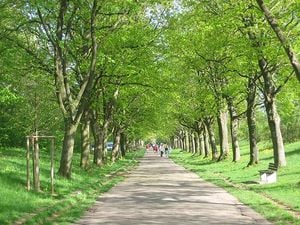
The first Resourcing CANs section is about ways of seeing resources, Resourcing CANs 2 looks at different forms of resource
People first![edit | edit source]
section needed - " people power is the biggest resource we have"[1]
Cosmo-local resources[edit | edit source]
section needed, potentially a major section? suggested ref[2]
"Every increase in local capacity to grow food, generate energy, repair, build and finance will strengthen the capacity to withstand disturbances of all kinds. Distributed energy in the form of widely disbursed solar and wind technology, for example, buffers communities from supply interruptions, failure of the electrical grid, and price shocks. Similarly, a regionally based, solar-powered food system would restore small farms, preserve soil, create local employment, rebuilt stable economies, and provide better food while reducing carbon emissions and dependence on long-distance transport from distant suppliers. The primary goal in rethinking development and economic growth is to create resilience – capacity to withstand the disturbances that will become more frequent and severe in the decades ahead." David Orr, Down to the Wire
Resources which enable gatherings[edit | edit source]
section needed, potentially a major section? The essence of Citizen Action Networks or any other kind of network is some form of gathering, either face-to-face, online or a mixture of the two. So resources which enable suitable gatherings are a sort of first essential eg Apps and tech and Spaces, premises and land. This is particularly felt in areas underserved in this respect, eg some rural areas of the UK.
Asset based community development[edit | edit source]
Asset-based community development (ABCD) is a methodology for the sustainable development of communities based on their strengths and potentials. It involves assessing the resources, skills, and experience available in a community; organizing the community around issues that move its members into action; and then determining and taking appropriate action. This method uses the community's own assets and resources as the basis for development; it empowers the people of the community by encouraging them to use what they already possess.
Community organising[edit | edit source]
"So that's why I've come to think that organizing is such a key thing, and such a key part of being human is… All an organizer is someone who's able to talk with the people around them and get them working together in the same direction. And that's desperately what we need right now. That's the closest to a kind of elixir that I have found to allow people to get the kind of courage that's required to stare, quite plainly, at the crisis that we're in, and not blink, and not turn away, and if they're shedding a tear, which they should be, nonetheless to be able to see through those tears to where we need to be, and how we're going to get there." Bill McKibben[3]
section needed
Inspiration[edit | edit source]
section needed, potential links with video resources, art, sports, culture, etc.
Integrated community resources[edit | edit source]
"One day soon, our high streets, parks, libraries, housing hubs, train stations, and cafes will become spaces for us to meet, repair, make, borrow, lend, grow, bake, reflect, care, and eat together." Rebecca Trevalyan FRSA[4]
examples of community resources that are part of, or conducive to the development of CANs: incl Makar house, etc.[5]
Arzeta dreams of a community center that would also function as a café and bakery, and a place where families could share social and emotional support. Aleida, Gloria and I fantasize about the community center of their dreams. They envision a comprehensive center with education, business, social and health supports all in one – not a place where "experts" would provide "services" to people in need, but a place where real people would support each other, because we are all experts in something, and we all have needs. Kate Duva, transitionnetwork.org
Resources
- Save a space in your local area, locality.org.uk
- Eleven Principles for Creating Great Community Places, Project for Public Spaces
Mutual aid[edit | edit source]
"There are some 2 billion people, many living sustainably with traditional livelihoods, who are unlikely to ever have access to banks or dominant money systems. Yet, their mutual aid and barter can be facilitated independently from our dysfunctional money systems, which are about scarcity, competition and fear. Barter and mutual aid are about cooperation, sharing and abundance." Hazel Henderson
section needed
Sharing[edit | edit source]
"No one has ever become poor by giving." Anne Frank
section needed
"And all that we learned, we shared with one another, so that wisdom ever grew greater. Robin Hobb
Visions and the power of our imagination[edit | edit source]
"Vision without action is a daydream, action without vision is a nightmare." Japanese proverb
section needed
"A shared vision is not an idea. It is not even an important idea such as freedom. It is, rather, a force in people's hearts, a force of impressive power. It may be inspired by an idea, but once it goes further -- if it is compelling enough to acquire the support of more than one person -- then it is no longer an abstraction. It is palpable. People begin to see it as if it exists. Few, if any, forces in human affairs are as powerful as shared vision." Peter Senge
Other ways of seeing resources[edit | edit source]
Cleveland / Preston model? etc.
Featured video[edit | edit source]
Notes and References
- What is a CAN? Information from The Alternative UK, thealternative.org.uk
- Daily Alternative articles about building CANs, thealternative.org.uk/dailyalternative
- CAN Insights, David Wilcox, Decmember 2020, docs.google.com
- ↑ ?
- ↑ What is "cosmo-localism"? Why do we think it's a game changer? And help fill out a dictionary for it, May 6, 2019 thealternative.org.uk
- ↑ Engaged Buddhism / What can we do about the Climate Crisis?
- ↑ RSA
- ↑ We don't need institutes, we need constitutes… and they should live in a Makar House, Pat Kane. Mar 16, 2020 thealternative.org.uk
